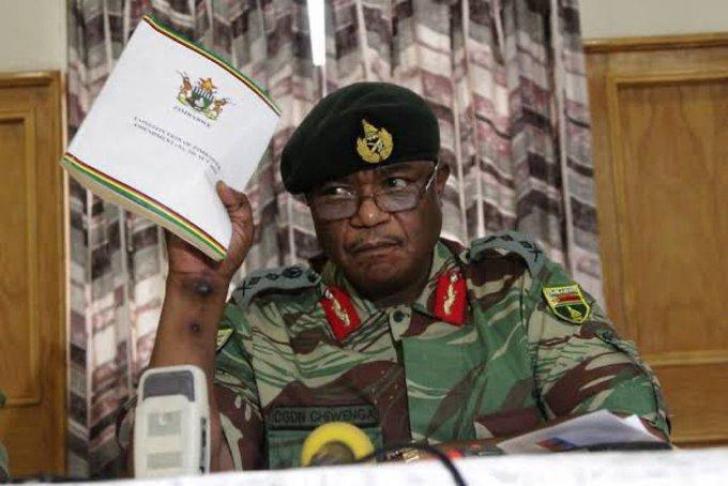News / National
Another coup won't solve Zimbabwe woes
24 May 2025 at 09:59hrs |
0 Views

President Emmerson Mnangagwa is currently at odds with a faction of liberation war veterans from the 1970s struggle for independence. This group has publicly pledged support for Vice-President Constantino Chiwenga and called for Mnangagwa's resignation, accusing him of failing to tackle rampant corruption and of plotting to extend his presidency beyond 2028 despite the country's deepening social and economic crises.
These veterans played a critical role in the 2017 military intervention that ousted former President Robert Mugabe and brought Mnangagwa to power, sparking widespread speculation that the present tensions could signal the emergence of another coup attempt.
Rumours abound that the military is backing Chiwenga's political ambitions, but the reality is more complex. Chiwenga does not enjoy unanimous support from the Zimbabwe Defence Forces' (ZDF) top brass. Understanding these divisions requires revisiting past conflicts within the military elite.
A notable incident occurred on December 13, 2008, when Air Marshal Perrance Shiri narrowly escaped an assassination attempt. Driving to his commercial farm, Shiri was ambushed by unidentified gunmen who opened fire, leaving him seriously wounded. Despite being shot, Shiri managed to drive himself to medical care and alerted Major-General Paradzayi Zimondi, head of Zimbabwe Prisons Services. An investigation revealed that the bullets and firearms used were supplied by the Zimbabwe Defence Industries, the military's own arms manufacturer, deepening suspicions of internal military strife.
This and other internal disputes, including accusations of corruption and struggles for authority among senior officers such as current ZDF commander Philip Valerio Sibanda, created rifts long before the 2017 coup. However, as detailed in the book The Overthrow of Robert Mugabe, these divisions were set aside in 2017 as senior officers united out of fear of losing power and privileges under Mugabe's rule, and out of resentment over Mugabe's sidelining of liberation war actors within Zanu PF.
Today, those shared concerns no longer bind the military leadership as they once did. Some key coup architects of 2017 have since died, and the remaining officers no longer feel their positions or privileges are under direct threat from Mnangagwa's administration. Nor are liberation war veterans entirely united in opposition to Mnangagwa, as he maintains careful relationships with the military elite through strategic patronage—a political skill his predecessor Mugabe lost in his later years.
Vice-President Chiwenga, despite his ambitions and role in the 2017 coup, faces the challenge of navigating these entrenched divisions within the military's top ranks. Mnangagwa's adept management of military loyalties complicates Chiwenga's efforts to consolidate support.
As tensions persist within Zimbabwe's political and military spheres, the possibility of another coup cannot be ruled out. Should one occur, it is more likely to be driven by junior soldiers—those less connected to Mnangagwa's patronage network and more directly affected by Zimbabwe's worsening socio-economic conditions.
However, coups initiated by lower-ranked troops succeed only about 32% of the time and tend to bring instability and violence, as junior forces often must violently assert control. The path out of Zimbabwe's ongoing political crisis remains uncertain, and the high costs of instability serve as a sobering reminder of the stakes involved.
These veterans played a critical role in the 2017 military intervention that ousted former President Robert Mugabe and brought Mnangagwa to power, sparking widespread speculation that the present tensions could signal the emergence of another coup attempt.
Rumours abound that the military is backing Chiwenga's political ambitions, but the reality is more complex. Chiwenga does not enjoy unanimous support from the Zimbabwe Defence Forces' (ZDF) top brass. Understanding these divisions requires revisiting past conflicts within the military elite.
A notable incident occurred on December 13, 2008, when Air Marshal Perrance Shiri narrowly escaped an assassination attempt. Driving to his commercial farm, Shiri was ambushed by unidentified gunmen who opened fire, leaving him seriously wounded. Despite being shot, Shiri managed to drive himself to medical care and alerted Major-General Paradzayi Zimondi, head of Zimbabwe Prisons Services. An investigation revealed that the bullets and firearms used were supplied by the Zimbabwe Defence Industries, the military's own arms manufacturer, deepening suspicions of internal military strife.
Today, those shared concerns no longer bind the military leadership as they once did. Some key coup architects of 2017 have since died, and the remaining officers no longer feel their positions or privileges are under direct threat from Mnangagwa's administration. Nor are liberation war veterans entirely united in opposition to Mnangagwa, as he maintains careful relationships with the military elite through strategic patronage—a political skill his predecessor Mugabe lost in his later years.
Vice-President Chiwenga, despite his ambitions and role in the 2017 coup, faces the challenge of navigating these entrenched divisions within the military's top ranks. Mnangagwa's adept management of military loyalties complicates Chiwenga's efforts to consolidate support.
As tensions persist within Zimbabwe's political and military spheres, the possibility of another coup cannot be ruled out. Should one occur, it is more likely to be driven by junior soldiers—those less connected to Mnangagwa's patronage network and more directly affected by Zimbabwe's worsening socio-economic conditions.
However, coups initiated by lower-ranked troops succeed only about 32% of the time and tend to bring instability and violence, as junior forces often must violently assert control. The path out of Zimbabwe's ongoing political crisis remains uncertain, and the high costs of instability serve as a sobering reminder of the stakes involved.
Source - online
Join the discussion
Loading comments…



























